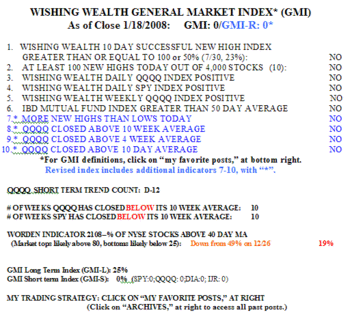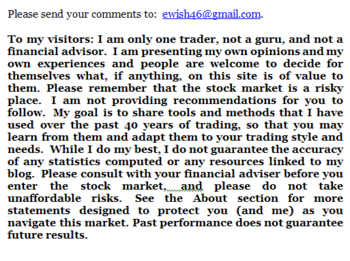The GMI and GMI-R have been zero since January 4. On Friday there were 844 new lows and just 10 new highs in my universe of 4,000 stocks.  This number was exceeded only by the 1,011 lows on January 9. It was also the fewest number of new highs since August 28, near the lows of last summer’s decline. Friday was the 12th day in the current QQQQ short term down-trend. However, note that the QQQQ and SPY have closed below their 10 week averages for ten weeks. I have written before that when these major indexes are below their ten week averages I rarely make money going long. In fact, since November 8, when the QQQQ first closed below its 10 week average, the QQQQ has declined 12% and 82% of its 100 component stocks closed lower on Friday than on November 8; only 13% have advanced 1% or more. During the same period 87% of the S&P500 stocks have declined. Can you see why it makes no sense to fight such odds?
This number was exceeded only by the 1,011 lows on January 9. It was also the fewest number of new highs since August 28, near the lows of last summer’s decline. Friday was the 12th day in the current QQQQ short term down-trend. However, note that the QQQQ and SPY have closed below their 10 week averages for ten weeks. I have written before that when these major indexes are below their ten week averages I rarely make money going long. In fact, since November 8, when the QQQQ first closed below its 10 week average, the QQQQ has declined 12% and 82% of its 100 component stocks closed lower on Friday than on November 8; only 13% have advanced 1% or more. During the same period 87% of the S&P500 stocks have declined. Can you see why it makes no sense to fight such odds?
So where do things stand now? It will take a long time for the indexes to rise above the critical moving averages I monitor. Nevertheless, the Worden T2108 indicator is in possible bottom territory at 19%. And the averages are in an almost vertical decline. These conditions may portend a bounce, especially with the Fed likely to act soon. It doesn’t pay to fight the Fed. The safest route, the one that lets me sleep at night, is the solution I quoted from Nicolas Darvas several posts ago–stay on the sideline and wait for the inevitable rise from the ashes, whenever that comes. The odds of benefiting from a rally are much greater when the QQQQ is above its 10 week average, currently at 49.81, versus its close Friday at 45.35. In other words , a rally would have to exceed about +10% for me to call a change in trend. There is clearly a lot of room on the up-side for failed, sucker rallies.
Until the turn comes, I am keeping a watchlist of stocks that have resisted the decline. I scan the IBD100 stocks for those close to their all-time highs and in an up-trend. I let IBD do the tough work of ranking all stocks by fundamental and technical strength. I then can focus on the top 100 stocks that they have identified. Some skeptics have told me that the IBD100 list identifies winners too late. Well, according to my sample of monthly lists of IBD100 stocks over the past two years, I found the following 2007 leaders showed up on at least one IBD100 stock list: ISRG: 8/2007, 199.13 (high after this date: 339.63); AAPL: 10/2006, 54.44 (202.96); GOOG: 10/2005, 310.65 (747.24); BIDU: 5/2007, 131.99 (235.28); GRMN: 10/2006, 47.93 (125.68) . If I had a complete list of the IBD 100 lists over the past years, I might find that some of these leaders were identified even earlier.
Now, I am not saying that all stocks that appear on the IBD100 list do well, they do not. But I use the list as a starting point to find stocks that meet my technical specifications, with the comfort that the list contains the best stocks in the market, according to IBD’s systematic technical and fundamental criteria. Stocks that weaken are quickly dropped from the list published each week by IBD. Even in this declining market there are stocks on the IBD100 lists that are resisting the current down-trend. I use TC2007 to find these stocks and to create a watchlist that may contain market leaders once the market turns. The key is to wait for the turn and not to be seduced into them now when false moves are very likely. Some of the 26 stocks that I am watching are: HMSY, VIVO and SRCL. Take a look at monthly and weekly charts of these stocks to get an idea of the types of technical patterns that I think are promising for purchasing a stock AFTER the beginning of an up-trend in the QQQQ.
